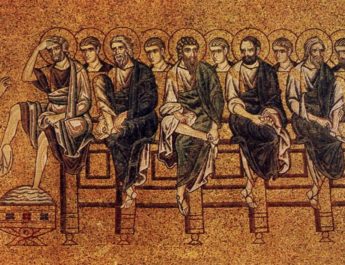Luke 6:20-31
All Saints’ Day C
20 Then he looked upA at his disciplesB and said:
“BlessedC are you who are poor,D
A “looked up” = epairo + ho + ophthalmos + autos. Literally, “lifted up his eyes.” Epairo is 19x in NT. From epi (on, upon, among, what is fitting) + airo (raise, take up, lift, remove). This is to lift up or raise in a literal or figurative sense. Figuratively, it could mean to exalt oneself. Ophthalmos is from optanomai (to appear, be seen by). This is eye or sight. It is used figuratively for the mind’s eye, a vision, or for envy.
B “disciples” = mathetes. From matheteuo (to make a disciple of); from manthano (to learn key facts, gain knowledge from experience; generally implies reflection as part of the learning process); from math– (thinking things through). This is a disciple, learner, or student. It is where we get “mathematics” from.
C “blessed” = makarios. From makar (happy); from mak– (to become long or large). This is blessed, happy, fortunate. It is when God’s grace/abundance is extended.
D “poor” = ptochos. From ptosso (to crouch or cower as a beggar does). This is poor or destitute – someone who is extremely poor and bowed down because of a long struggle under poverty. Properly, it means bent over so figuratively it is someone who is deeply destitute and lacking tangible resources. This is a beggar – as extremely opposite a wealthy person as possible.
for yours is the kingdomE of God.F
21 “Blessed are you who are hungryG now,
E “kingdom” = basileia. From basileus (king, emperor, sovereign); probably from basis (step, hence foot; a pace); from baino (to walk, to go). This is kingdom, rule, authority, sovereignty, royalty, a realm.
F “God” = Theos. From Proto-Indo-European origins, meaning do, put, place. This is God or a god in general.
G “are hungry” = peinao. From peina (hunger); related to penomai (working for a living; laborer, poor person; to work for daily bread); from peno (to toil to survive day by day). This is to hunger, be needy, or desire earnestly. It can be being famished in a definitive sense or in comparison to someone or something else. Figuratively, this means to crave.
for you will be filled.H
“Blessed are you who weepI now,
for you will laugh.J
H “filled” = chortazo. 16x in NT. From chortos (food, grass, grain, hay; a place for feeding, a court, garden; by implication, a pasture or vegetation). This is to feed, fodder, fill, or satisfy. It carries the sense of abundantly supplied food – even gorging on food.
I “weep” = klaio. This is to weep, lament, or sob. It is weeping aloud.
J “laugh” = gelao. 2x in NT – both in this passage. This is to laugh or smile.
22 “Blessed are you when peopleK hateL you and when they excludeM you, revileN you,
K “people” = anthropos. Related to “looked up” in v20. Probably from aner (man, male, husband) + ops (eye, face); {from optanomai (see note A above)}. This is human, humankind. Used for all genders.
L “hate” = miseo. From misos (hatred). This word is used in two ways in the New Testament. One has to do with how we prioritize. In order to prioritize something the highest, it means we have to rank other things lower. We cannot have 10 number one priorities. So, the nine that are not number 1, we love less or we value them lower. We make a moral choice the springs from our values about where we put our time, efforts, energy, etc. The other way is detesting or hatred as we normally think of it. This sense has a particular affinity with persecuting the one we hate.
M “exclude” = aphorizo. 10x in NT. From apo (from, away from) + horizo (to determine, set boundaries, appoint, designate, pre-determined; literally, this is setting horizons); {from the same as horion (boundary, territory); from horos (limit, boundary)}. This is to set off by a boundary – to divide, separate, exclude. It can also mean ostracize or keep aloof.
N “revile” = oneidizo. 9x in NT. From oneidos (a personal disgrace that leads to harm to one’s reputation, a taunt or reproach); perhaps from the base of onoma (name, authority, cause, character, fame, reputation); perhaps from ginosko (know, recognize, learn from firsthand experience). This is to disgrace, insult, mock, blame, or curse someone so as to create shame. This is when a person or thing is considered guilty and deserving punishment. So, it can be denounce, revile, defame, or chide.
and defameO you on account of the SonP of Man.Q
O “defame” = ekballo + ho + onoma + su + hos + poneros. Literally, “cast out your name as evil.” Ekballo is from ek (from, from out of) + ballo (to throw, cast, place, put, drop). This is to throw, put out, produce, expel, banish. It is eject in a literal or figurative sense. Onoma is related to “revile” in v22. See note N above. Poneros is related to “hungry” in v21. From poneo (to toil); related to ponos (pain, trouble, labor, distress, suffering; toil, which implies anguish); from the base of penes (a laborer, poor person, starving or indigent person; someone who works for their living); from penomai (see note G above). This is bad, evil, wicked, malicious, grievous, or toilsome. Properly, it is something that bears pain – it emphasizes the miseries and pains that come with evil. By contrast, the Greek kakos refers to evil as part of someone’s core character. Also contrasting the Greek sapros, which deals with falling away from a previously embodied virtue. This word can mean ill, diseased, morally culpable, derelict, vicious, malicious, or guilt. It can also refer to the devil or sinners.
P “Son” = Huios. This is son, descendant – a son whether natural born or adopted. It can be used figuratively for other forms of kinship.
Q “Man” = anthropos. Same as “people” in v22. See note K above.
23 RejoiceR on that dayS and leap for joy,T
R “rejoice” = chairo. From char– (to extend favor, lean towards, be inclined to be favorable towards). This is to rejoice, be glad or cheerful; a greeting. This is the root verb that the Greek word for “grace” comes from (charis).
S “day” = hemera. Perhaps from hemai (to sit). This is day, time, or daybreak.
T “leap for joy” = skirtao. 3x in NT. From skairo (to skip). This is to leap or jump, to bound. It can refer to a quickening.
for surelyU your rewardV is greatW in heaven,X
U “surely” = idou. From eido (to be aware, see, know, remember, appreciate). This is see! Lo! Behold! Look! Used to express surprise and or draw attention to the statement.
V “reward” = misthos. This is wages, pay, or salary. It can also be reward, recompense, or punishment. It is pay for services rendered in a literal or figurative way, either good or bad.
W “great” = polus. This is much, often, plenteous – a large number or a great extent.
X “heaven” = ouranos. May be related to oros (mountain, hill) with the notion of height. This is the air, the sky, the atmosphere, and heaven. It is the sky that is visible and the spiritual heaven where God dwells. Heaven implies happiness, power, and eternity.
for that is how their ancestorsY treatedZ the prophets.AA
24 “But woeBB to you who are rich,CC
Y “ancestors” = pater. This is father in a literal or figurative sense. Could be elder, senior, ancestor, originator, or patriarch.
Z “treated” = poieo. This is to make, do, act, construct, abide, or cause.
AA “prophets” = prophetes. From pro (before, in front of, earlier than) + phemi (to declare, say, use contrasts in speaking to shed light on one point of view); {from phao (to shine) or phaino (to bring light, cause to appear, shine, become visible or clear)}. This is a prophet or poet – one who speaks with inspiration from God.
BB “woe” = ouai. This is alas or woe to show grief or to denounce something.
CC “rich” = plousios. Related to “great” in v23. From ploutos (abundance, wealth, or riches; money, possessions, spiritual abundance, or a valuable bestowment); from polus (see note W above) OR pleo (to sail, voyage); {probably from pluno (to plunge – so to wash); from pluo (to flow)} OR pletho (to fill, accomplish, supply; to fill to maximum capacity). This is wealthy, having full resources. It can be a rich person or refer to God’s abundance.
for you have receivedDD your consolation.EE
25 “Woe to you who are fullFF now,
for you will be hungry.
“Woe to you who are laughing now,
for you will mournGG and weep.
DD “received” = apecho. 19x in NT. From apo (from, away from) + echo (to have, hold, possess). This is to be distant, have fully, abstain, be paid, be distant, be enough. It is having something by detaching it from something else or releasing something else.
EE “consolation” = paraklesis. From parakaleo (to call to, summon, invite, request, or beg; to exhort or admonish; to encourage, comfort, or console; has legal overtones and is used of one’s advocate in a courtroom); {from para (beside, by, in the presence of) + kaleo (to call by name, invite, to name, bid, summon, call aloud); {related to keleuo (to command, order, direct); from kelomai (to urge on)}}. This is calling someone for help, a personal exhortation, comfort, encouragement, joy, entreaty, urging. This word comes from a legal setting – as bringing evidence to advocate for another in court. This word is related to the word “Advocate” or paraclete used for the Holy Spirit.
FF “are full” = empiplemi. Related to “great” in v23 & “rich” in v24. 5x in NT. From en (in, on, at, by, with, among) + same as pleistos (most, very great, much, very numerous); {from polus (see note W above)}. This is to fill up or satisfy literally or figuratively.
GG “mourn” = pentheo. 10x in NT. From penthos (mourning, sorrow, sadness, grief); perhaps from pascho (to be acted on for good or ill; often used for negative treatment; properly, feeling strong emotions – especially suffering; can also be the ability to feel suffering). This is used for grieving a death, but also figuratively for loss of hope or end of a relationship. This is embodied grief that is readily apparent. This is grief as a feeling or the act of grieving.
26 “Woe to you when allHH speak wellII of you, for that is how their ancestors treated the false prophets.JJ
HH “all” = pas + ho + anthropos. Pas is all or every. Anthropos is the same as “people” in v22. See note K above.
II “well” = kalos. From kalos (good, noble, beautiful, correct, or worthy; external signs of goodness like beauty, demonstrations of honorable character, showing moral virtues; a different word, agathos, speaks of intrinsic good). This is nobly, rightly, well-perceived, seen as appealing, morally pleasing, honorably.
JJ “false prophets” = pseudoprophetes. Related to “prophets” in v23. 11x in NT. From pseudes (false, lying, wicked); {from pseudomai (to lie, deceive, falsify)} + prophetes (see note AA above)}. This is false prophet – one who pretends they are prophesying from God or who teaches something that is false, but still attributes it to God.
27 “But I sayKK to you who are listening:LL LoveMM
your enemies;NN doOO goodPP to those who hate you;
KK “say” = lego. This is to speak, say, name, call, command. It is generally to convey verbally.
LL “listening” = akouo. This is hear or listen, but it also means to understand by hearing. This is where the word “acoustics” comes from.
MM “love” = agapao. Perhaps from agan (much). This is love, longing for, taking pleasure in. It is divine love or human love that echoes divine love.
NN “enemies” = echthros. From echthos (hatred). This is an openly hostile person so an enemy, a foe, or a hated person. This speaks of irreconcilable hostility. It can also mean adversary and/or refer to Satan.
OO “do” = poieo. Same as “treated” in v23. See note Z above.
PP “good” = kalos. Same as “well” in v26. See note II above.
28 blessQQ those who curseRR you; praySS for those who mistreatTT you.
QQ “bless” = eulogeo. Related to “say” in v27. From eu (good, well, well done, rightly) + logos (word, statement, speech, analogy; a word that carries an idea or expresses a thought, a saying; a person with a message or reasoning laid out in words; by implication, a topic, line of reasoning, or a motive; can be used for a divine utterance or as Word – Christ); {from lego (see note KK above)}. Properly, this is speaking well of – speaking so that the other is benefited. It can mean praise, bless, thank, or call for a blessing. This is where “eulogy” comes from.
RR “curse” = kataraomai. Related to “looked up” in v20. 6x in NT. From katara (curse, accursed; a curse as penalty); {from kata (down, against, throughout, among) + ara (prayer, curse, imprecation; a pray for evil); {probably from airo (see note A above)}}. This is to curse, execrate, doom.
SS “pray” = proseuchomai. From pros (advantageous for, at, toward) + euchomai (to wish, make a request, pray). This is to pray or pray for, to worship or supplicate. It is more literally exchanging one’s own wishes for God’s.
TT “mistreat” = epereazo. 2x in NT. From epereia (spiteful abuse) OR from epi (on, upon, what is fitting) + areia (threats). This is to insult, mistreat, or slander. It includes making threats or smearing another’s reputation. It is reviling that is tailored to someone in particular.
29 If anyone strikesUU you on the cheek,VV offerWW the otherXX also,
UU “strikes” = tupto. 14x in NT. This is to strike, beat, or wound – generally with a stick or cudgel. It is hitting with repeated blows. So, it contrasts with paiso and patasso, which describe single blows by hand or weapon. Also contrast plesso (beating with a fist or hammer), rhapizo (to slap), and tugchaono (hitting accidentally). This word is hitting to punish. Figuratively, it can refer to being offended.
VV “cheek” = siagon. 2x in NT. This is jawbone or cheek.
WW “offer” = parecho. Related to “received” in v24. 16x in NT. From para (beside, by, in the presence of) + echo (see note DD above). This is present, to show, bring, give, offer to hold near.
XX “other” = allos. This is other, another. Specifically, it is another of a similar kind or type. There is a different word in Greek that speaks of another as a different kind (heteros).
and from anyone who takes awayYY your coatZZ do not withholdAAA even your shirt.BBB
YY “takes away” = airo. Related to “looked up” in v20 & “curse” in v28. See note A above.
ZZ “coat” = himation. From heima (garment) OR from ennumi (to put on). This is the outer garment, cloak, robe, or mantle. It is worn loosely over a tunic.
AAA “withhold” = koluo. Perhaps from the same as kolazo (to punish, particularly to punish slaves so that they are restricted or chastised); from kolos (docked, dwarf). This is to hinder or prevent, restrain, refuse. It can be prevent, whether through words or actions.
BBB “shirt” = chiton. 11x in NT. From a Semitic language – see Hebrew kethoneth (tunic). Root means to cover. This is the garment worn beneath the cloak or robe – the one that is closest to the skin.
30 GiveCCC to everyoneDDD who asksEEE of you, and if anyone takes away what is yours, do not ask for it back again.FFF 31 Do to othersGGG as you would haveHHH them do to you.
CCC “give” = didomi. To give, offer, place, bestow, deliver. This is give in a literal or figurative sense.
DDD “everyone” = pas. Same as “all” in v26. See note HH above.
EEE “asks” = aiteo. This is to ask, demand, beg, desire.
FFF “ask…again” = apaiteo. Related to “asks” in v30. 2x in NT. From apo (from, away from) + aiteo (see note EEE above). This is to ask back, ask again, demand.
GGG “others” = anthropos. Same as “people” in v22. See note K above.
HHH “would have” = thelo. This is to wish, desire, will, or intend. It is to choose or prefer in a literal or figurative sense. It can also mean inclined toward or take delight in. It can have a sense of being ready to act on the impulse in question.
Image credit: “Global Refugee Mural” by Joel Bergner, 2009.




